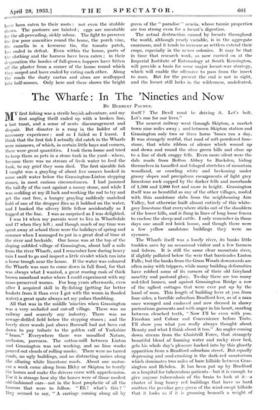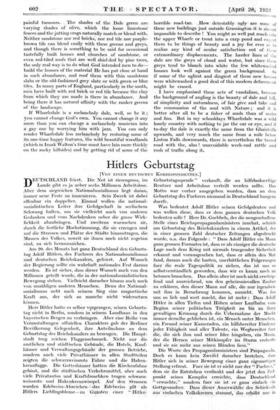The Wharfe : In The 'Nineties and Now BY HERBERT
PALMER.
MY first fishing was a sterile boyish adventure, and my - first angling thrill ended up with a broken line, a lost trout, and a sense of acute discouragement and despair. But disaster is a rung in the ladder of all necessary experience ; and as I failed so I learnt. I think that the first fish .I actually did catch in the Wharfe were minnows, of which, in certain little bays and corners, there were great quantities. I took them home and tried to keep them as pets in a stone tank in the yard—where, because there was no stream of fresh water to feed the tank, to my grief they soon died. The first sizeable fish I caught was a grayling of about five' Ounces hooked in some swift water below the Grassington-Linton stepping stones, in most curious circumstances. I had jammed the tail-fly of the cast against a mossy stone, and while I was scolding at my ill luck and working the rod to try and get the cast free, a hungry grayling suddenly snatched hold of one of the dropper flies as it bobbed on the water, and I hooked the silvery little fellow accidentally as I tugged at the line. I was as surprised as I was delighted.
I was 14 when my parents went to live in Wharfedale and 17 when they left ; and though much of my time was spent away at school there were the holidays of spring and summer when I managed to put in a great deal of time at the river and beckside. Our house was at the top of the sloping cobbled village of Grassington, about half a mile from the river Wharfe, and I remember how during heavy rain I used to go and inspect a little rivulet which ran into a horse trough near the house. If the water was coloured the Wharfe was sure to come down in full flood, for that was always what I wanted, a great roaring rush of thick brown moorland water where I could experiment with my moss-preserved worms. For long years afterwards, even after I acquired skill in fly-fishing (getting far better baskets from it than ever I got with the worm in flooded water) a great spate always set my pulses throbbing.
All that was in the middle 'nineties when Grassington was a very secluded and cut-off village. There was no railway and scarcely any industry. There was no sewage-defiled field below the stepping stones ; and the lovely river woods just above Burnsall had not been cut down to pay tribute to the golden calf of Yorkshire " brass." Everywhere there was unsullied Nature, seclusion; pureness. The cotton-mill between Linton and Grassington was not working, and no lime works poured out clouds of rolling smoke. There were no tarred roads, no ugly buildings, and no distracting noises along the alluring white limestone roads. About one motor- car a week came along from Ilkley or Skipton to terrify the horses and make the drivers curse with apprehension. For it is strange how shy the horses were of those modest old-fashioned cars—not in the least prophetic of all the horrors that were to follow. " Eh t What's this ? " they seemed to say, " A carriage coming along all by itself ? The Devil must be driving it. Let's bolt. Let's run for our lives."
The nearest railway went through Skipton, a market town nine miles away ; and between Skipton station and Grassington only two or three horse 'buses ran a day. It was strangely restful, that road of soft-powdered lime- stone, that white ribbon of silence which wound up and down and round the olive green hills and close up to a line of dark craggy fells. Even more silent were the dale roads from Bolton Abbey to Buckden, hiding themselves in tasselled and foliaged stretches of mountain woodland, or crawling white and beckoning under grassy slopes and precipitous escarpments of light grey- limestone rock capped by the darker fells and moorlands of 1,500 and 2,000 feet and more in height. Grassington itself was as beautiful as any of the other villages, roofed with thin sandstone slabs from the neighbouring Aire Valley, but otherwise built almost entirely of this white- grey limestone that everywhere sticks out of the shoulders of the lower hills, and is flung in lines of long loose fences to enclose the sheep and cattle. I only remember in those days one small red brick house, and though there were a few yellow sandstone buildings they were no eyesores.
The Wharfe itself was a lonely river, its banks little trodden save by an occasional visitor and a few farmers and fishers. It is still the same clear mountain river, if slightly polluted below the weir that barricades Linton Falls ; but the banks from the Grass Woods downwards are often noisy with trippers, while many building deformities have robbed some of its corners of their old fairyland sanctity and pastoral glory. To-day there are too many red-tiled houses, and against Grassington Bridge a row of the ugliest cottages that were ever put up by the hand of man. This length of building leers at you from four sides, a horrible suburban Bradford leer, as of a man once wronged and enslaved and now dressed in showy pretentious garments and with anger in his heart, snarling between clenched teeth, " Now I'll be even with you. Freedom and Colour and Convenience before Taste. I'll show you what you really always thought about Beauty and what I think about it too." An angler coming down stream from the Ghaistrill Force, that strangely beautiful blend of foaming water and rocky river bed, gets his whole day's pleasure hacked into by this ghastly apparition from a Bradford suburban street. But equally depressing and soul-crushing is the dark-red sanatorium which dominates two miles of bare hillside between Gras- sington and Hebden. It has been put up by Bradford as a hospital for tuberculous patients—but it is enough to give anyone tuberculosis of the brain to look at it—a cluster of long heavy red buildings that have so hard smitten the peculiar grey-green of the wind-swept hillside that it looks as if it is groaning beneath a weight of painful tumours. . the shades • of the Dale green - are. varying shades_ of olive, which the loose limestone fences and the jutting crags naturally match or blend with. Neither sandstone nor red bricks; nor red tile nor purple- brown tile can blend easily with these greens and greys, and though there is something to be said for occasional tastefully built houses, and churches of sandstone, or even red-tiled roofs that are well shiel ded by pine trees, the only real way is to do what God intended men to do— build the houses of the material He has put close at hand in such abundance, and roof them with thin sandstone slabs or the old-fashioned grey slate or with green or blue tiles. In many parts of England, particularly in the south, men have built with, red brick or red tile because the clay from which they are made is there in abundance. And being there it has natural affinity with the ranker greens of the landscape.
If Wharfedale is a melancholy dale, well, so be it ; you cannot change God's own. You cannot change it any more than you can change a melancholy musician into a gay one by worrying him with jazz. You can only render Wharfedale less melancholy by restoring some of its one-time happy features, the wild beautiful woodlands (which in Izaak Walton's time must have lain more thickly on the rocky hillsides) and by getting rid of some of the horrible road-tar, _How - detestably .ugly • are, some of these new buildings lust outside --Grassingtonit is ahnost impossible to describe ! You might as well put roach into the upper Wharfe or- trout into a carp- pond and expect them to be- things of beauty and a joy for ever as to realize any kind of ocular -satisfaction out of these extraordinary displacements. The harder lines of the dale are the greys of cloud and water,- but since these greys tend to blanch into white the few whitewashed houses look well against the green background. so if some of the ugliest and dingiest of these new houses were whitewashed a good deal of this modern-defacement might be erased. .
. I . have emphasised these acts of vandalism,.. because the background of angling is the beauty of dale and hill, of. simplicity and naturalness, of fair give and take and the communion of the soul with Nature ; and it is better after all. to be a fisher . of souls than of scales and fins. But in my schooldays. Wharfedale was. a wild lonely country_ with nothing to jar the ear .or..eye, and if to-day the dale is exactly the same from the Ghaistrills upwards, and very much the same from a mile below Linton Falls downwards, there is nevertheless the tarred road with the, alas ! unavoidable week-end rattle and rush of traffic along it.







































 Previous page
Previous page